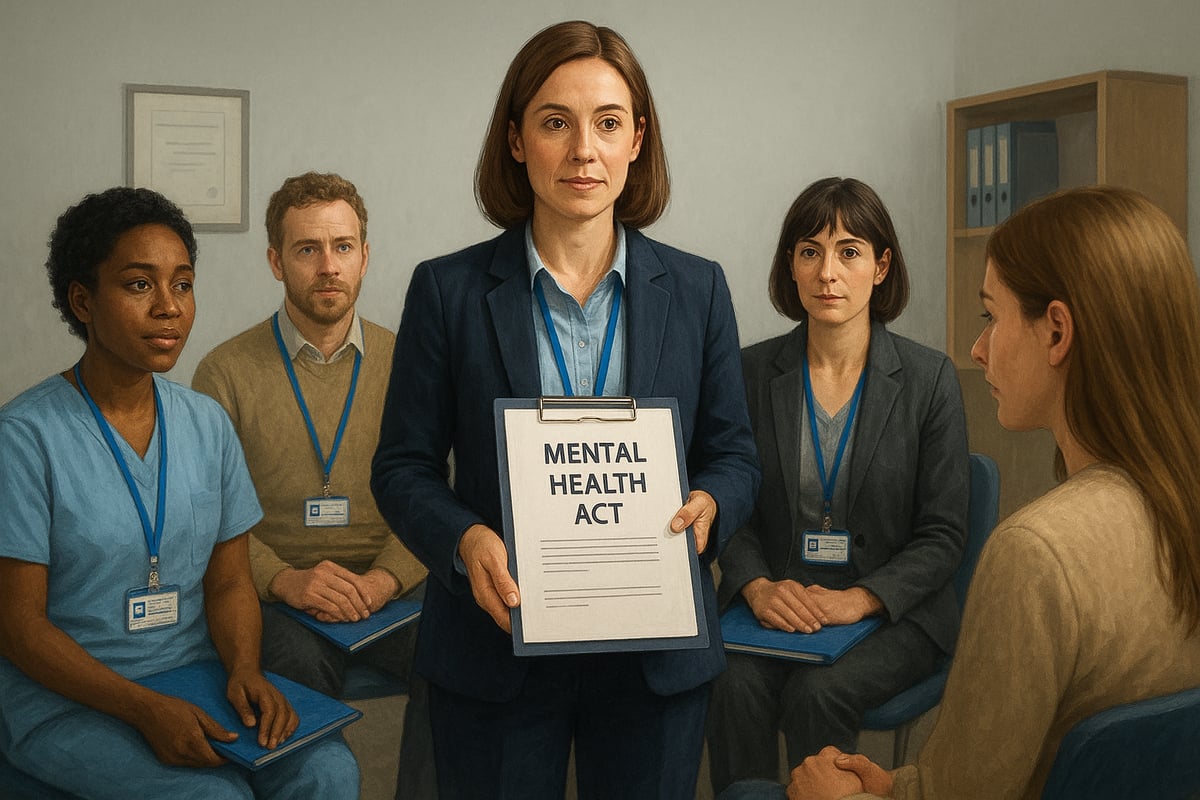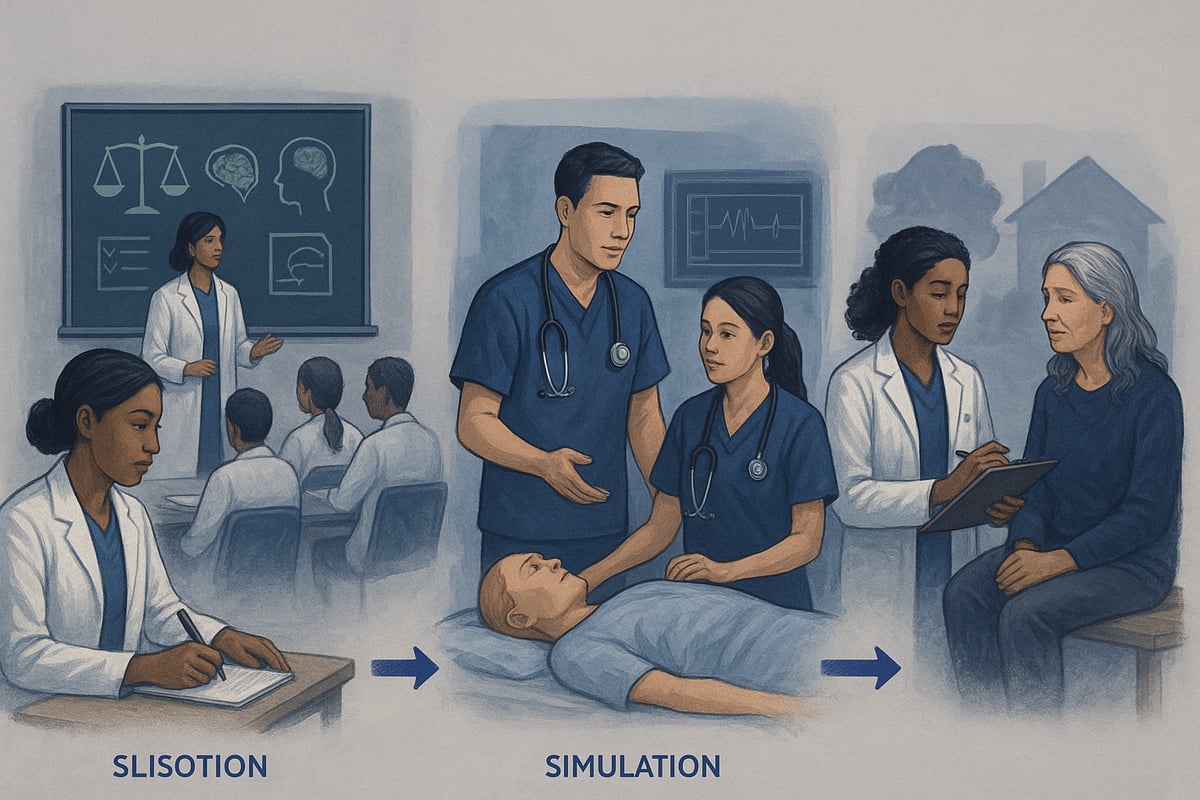In 2025, the demand for Approved Mental Health Professionals (AMHPs) is projected to reach record levels across the UK. As mental health services evolve, understanding approved mental health professional training is more vital than ever for those seeking to make a meaningful impact.
This comprehensive guide breaks down every step, from eligibility and entry requirements to practical skills, assessment, and ongoing professional development. Whether you are a social worker, nurse, psychologist, or occupational therapist, this resource will help you navigate the pathways to qualification.
Curious about advancing your career and making a real difference? Follow our expert guidance to confidently take the next step in your journey as an AMHP.
Understanding the Role of an Approved Mental Health Professional
Approved Mental Health Professionals (AMHPs) play a pivotal role within the UK’s mental health system, ensuring individuals in crisis receive safe, lawful, and compassionate care. The need for approved mental health professional training has grown rapidly, as AMHPs are uniquely authorized to make complex legal and ethical decisions under the Mental Health Act. According to the AMHP role overview, AMHPs are central to safeguarding rights and balancing the needs of individuals, families, and communities.

What Is an Approved Mental Health Professional?
An AMHP is a qualified mental health practitioner, such as a social worker, nurse, psychologist, or occupational therapist, who has completed approved mental health professional training. Their authority is embedded in the Mental Health Act 1983, empowering them to coordinate and carry out Mental Health Act assessments. These professionals ensure that each decision to detain or treat someone involuntarily is made with rigorous attention to human rights and legal standards.
The distinction between AMHPs and other mental health professionals lies in their statutory powers. While social workers or nurses may support treatment and care planning, only AMHPs can lead Mental Health Act assessments and apply for compulsory admission. This unique position demands exceptional legal literacy, ethical judgment, and resilience.
Core Responsibilities and Distinctions
AMHPs are entrusted with a range of vital duties, all of which require specialized skills developed through approved mental health professional training. Their core responsibilities include:
- Leading Mental Health Act assessments
- Making decisions about compulsory hospital admission
- Liaising with families, police, and health professionals
- Safeguarding individual rights and wellbeing
Let’s compare the roles:
| Role | Assessment | Legal Application | Lead MHA Assessments | Compulsory Admission |
|---|---|---|---|---|
| AMHP | ✔️ | ✔️ | ✔️ | ✔️ |
| Social Worker | ✔️ | ✖️ | ✖️ | ✖️ |
| Nurse | ✔️ | ✖️ | ✖️ | ✖️ |
| Psychologist | ✔️ | ✖️ | ✖️ | ✖️ |
For example, during an emergency intervention, the AMHP coordinates with police and doctors to assess risk, ensuring everyone’s safety. In Mental Health Act assessments, they gather multi-agency input, weigh risks, and decide on the least restrictive options.
Approved mental health professional training also prepares AMHPs for high-pressure situations, such as out-of-hours crises or complex family dynamics. Their decisions can have life-changing consequences, requiring clarity, empathy, and advanced communication skills.
Demand, Skills, and Real-World Impact
The demand for AMHPs has surged, with NHS workforce reports indicating a 15% increase since 2020. This trend highlights the urgent need for more professionals to complete approved mental health professional training and fill critical service gaps.
Essential skills for AMHPs include:
- Legal and ethical decision-making
- Advanced risk assessment
- Effective communication with service users and families
- Cultural competence and sensitivity
- Reflective and trauma-informed practice
AMHPs have a measurable impact on patient outcomes and service efficiency. Their involvement leads to fairer assessments, reduced delays, and better safeguarding of individual rights. Many AMHPs describe the role as both challenging and deeply rewarding. They often face emotionally charged situations, yet find purpose in advocating for vulnerable people and upholding the law.
Ultimately, the role of the AMHP is indispensable in today’s mental health landscape. As the sector evolves, the value of robust approved mental health professional training will only continue to grow.
Eligibility and Entry Requirements for AMHP Training
Understanding who can access approved mental health professional training is crucial for anyone considering this career path. With demand for AMHPs rising steadily, knowing the eligibility criteria is the first step to joining this vital workforce.

Professional Qualifications and Experience
To begin the approved mental health professional training journey, candidates must already hold a recognized qualification in social work, nursing, occupational therapy, or psychology. Most programs require at least two years of post-qualification experience working within mental health settings. This ensures trainees possess foundational skills and real-world exposure.
Experience in statutory mental health work is highly valued. In fact, 80% of AMHP trainees in 2023 had prior statutory experience before entering training. Candidates are expected to demonstrate a commitment to mental health practice and a solid understanding of the field’s complexities. For comprehensive details, refer to the current AMHP course guidance, which outlines the standards and expectations for entry.
Comparison Table: Eligible Professions and Typical Requirements
| Profession | Minimum Experience | Statutory Experience Preferred |
|---|---|---|
| Social Worker | 2+ years post-qualification | Yes |
| Nurse | 2+ years post-qualification | Yes |
| Occupational Therapist | 2+ years post-qualification | Yes |
| Psychologist | 2+ years post-qualification | Yes |
Registration, References, and Employer Sponsorship
Eligibility for approved mental health professional training extends beyond qualifications. Applicants must be registered with their respective professional bodies, such as the HCPC for social workers or the NMC for nurses. This registration confirms professional standing and ethical conduct.
Most training providers also require strong references supporting the candidate’s suitability for the AMHP role. Employer sponsorship is typically necessary, as organizations play a key role in supporting trainees through funding and protected learning time. This organizational backing demonstrates a shared commitment to high-quality mental health services.
Personal Attributes and Suitability
Academic and professional requirements are only part of the picture. Successful applicants for approved mental health professional training consistently show resilience, empathy, and advanced communication skills. These attributes are essential for managing complex and sometimes high-pressure situations.
For example, a social worker moving into AMHP training might highlight their experience handling crisis interventions, collaborating with multidisciplinary teams, and advocating for service users’ rights. These qualities ensure AMHPs can provide compassionate, legally sound assessments.
Regional Variations and Recent Data
Entry requirements for approved mental health professional training can differ across the UK. Some regions may require additional statutory experience or specific training in local procedures. Prospective trainees should always check with their local authority or preferred training provider for the most accurate information.
Recent data highlights that 80% of trainees entering AMHP programs in 2023 already had statutory mental health experience, underlining the competitive and specialized nature of the field. Organizational support and a commitment to ongoing development are key factors in successful applications.
The AMHP Training Pathway: Step-by-Step Guide
Becoming an Approved Mental Health Professional in 2025 involves a structured and rigorous journey. Each stage of the approved mental health professional training pathway is designed to ensure candidates develop the expertise, confidence, and resilience needed for this high-impact role.
Below, we break down the process step by step, providing clarity on what to expect and how to prepare for each phase.

Step 1: Application and Selection Process
The first stage of approved mental health professional training is the application and selection process. Prospective candidates must identify accredited programs, which are typically offered by universities in partnership with local authorities or NHS trusts.
Applicants prepare detailed CVs, gather professional references, and draft supporting statements that highlight experience, motivation, and suitability for the AMHP role. Selection panels assess candidates through interviews, focusing on legal literacy, ethical awareness, and capacity for reflective practice.
A successful applicant often demonstrates resilience, strong communication skills, and a clear understanding of statutory responsibilities. For example, one social worker shared that thorough preparation for scenario-based questions was critical to her acceptance.
Acceptance rates vary, with leading providers reporting that only one in five applicants secure a place. Staying updated on the AMHP training standards update ensures you meet the latest requirements and understand what selection panels are seeking.
Step 2: Core Curriculum and Learning Outcomes
Once enrolled, the core curriculum of approved mental health professional training builds a solid foundation in legal, ethical, and practical knowledge. Mandatory modules include:
- Mental Health Act 1983 (as amended)
- Deprivation of Liberty Safeguards
- Human rights and equality law
- Advanced risk assessment
- Cultural competence and trauma-informed care
Teaching methods blend lectures, seminars, group discussions, and case study analysis. Many programs incorporate simulation exercises to develop practical decision-making skills.
A typical timetable might feature two days of classroom learning, one day of online seminars, and independent study throughout the week. In 2025, blended learning options are expanding, offering greater flexibility for candidates balancing work and study.
Course content is regularly updated to reflect current research and best practices. This ensures that approved mental health professional training remains relevant to real-world scenarios, preparing candidates for the evolving demands of the profession.
Step 3: Practical Placement and Supervised Practice
Practical placement is widely regarded as the most transformative aspect of approved mental health professional training. Trainees complete a minimum number of supervised hours in diverse settings, such as community mental health teams, crisis services, and hospital wards.
Practice educators and mentors provide ongoing feedback, supporting trainees in developing assessment, report writing, and multidisciplinary working skills. Assessment during placement includes direct observation, reflective journals, and structured feedback sessions.
A day in the life of an AMHP trainee might involve shadowing a senior practitioner during a Mental Health Act assessment, participating in risk management meetings, and reflecting on ethical challenges faced in the field.
According to recent surveys, 95 percent of trainees rate placements as the most valuable component of their training experience. This phase bridges theory and practice, equipping candidates to handle the realities of frontline mental health work.
Step 4: Assessment, Qualification, and Registration
The final stage of approved mental health professional training is the assessment and qualification process. Trainees compile a portfolio demonstrating competence across key domains, including legal literacy, risk assessment, and ethical decision-making.
Assessment methods include written exams, observed practice, and professional discussions with assessors. Successfully passing these components earns the candidate the AMHP qualification, which is followed by formal registration with the appropriate regulatory body.
Most candidates complete this phase within six to twelve months, though some face challenges with portfolio documentation or legal knowledge assessments. However, support from mentors and peers often helps overcome these hurdles.
Achieving AMHP status marks the culmination of a demanding journey, opening doors to advanced roles in mental health services and ensuring that professionals are equipped to deliver safe, ethical, and effective care.
Essential Skills and Competencies for AMHPs in 2025
Stepping into the role of an Approved Mental Health Professional in 2025 demands a robust set of skills that go beyond foundational knowledge. As mental health care evolves, so do the competencies required for effective and ethical practice. The following sections outline the core abilities every candidate should focus on during approved mental health professional training.

Legal and Ethical Decision-Making
A central pillar of approved mental health professional training is the ability to make sound legal and ethical decisions. AMHPs must interpret and apply the Mental Health Act 1983, human rights law, and related legislation with precision.
Every decision impacts individual liberty and wellbeing. AMHPs routinely balance patient rights against public safety, requiring a nuanced understanding of consent, capacity, and deprivation of liberty. Ethical dilemmas frequently arise, such as when a service user refuses treatment or when family wishes conflict with clinical recommendations.
Key skills include:
- Legal literacy and up-to-date legislative knowledge
- Applying statutory criteria in real scenarios
- Documenting decisions with clarity and transparency
Rigorous training, ongoing updates, and reflective practice are essential to maintain competence in this area. Approved mental health professional training places significant emphasis on these aspects.
Advanced Risk Assessment Techniques
Risk assessment is a core component of the AMHP role. Professionals must identify, evaluate, and manage risks associated with mental health crises, including harm to self or others.
Modern approved mental health professional training covers advanced risk assessment models, emphasizing dynamic rather than static approaches. Trainees learn to use structured tools, combine them with clinical judgment, and adapt to rapidly changing situations.
Effective risk management involves:
- Assessing acute and chronic risk factors
- Collaborating with multidisciplinary teams for holistic views
- Regularly updating assessments as situations evolve
In high-pressure environments, the ability to remain objective and analytical is crucial. Approved mental health professional training prepares candidates to make these difficult judgments confidently.
Communication and Multidisciplinary Collaboration
Communication is the most cited skill among recent AMHPs, with 82% naming it as critical to their success. Clear, compassionate dialogue with service users, relatives, and professionals is central to the role.
Approved mental health professional training focuses on building rapport, de-escalating crises, and ensuring that all voices are heard during assessments. Collaboration with psychiatrists, social workers, police, and legal representatives is routine.
Best practices include:
- Active listening and empathy
- Managing conflict and mediating between parties
- Presenting complex information in accessible language
Strong communication ensures assessments are thorough, fair, and understood by everyone involved.
Cultural Competence and Trauma-Informed Practice
The UK’s increasingly diverse population means AMHPs must be culturally competent and sensitive to a wide range of backgrounds. Understanding cultural beliefs, stigma, and barriers to care is essential for equitable service delivery.
Approved mental health professional training integrates cultural competence into every module. Trainees learn to recognize their own biases, adapt assessment strategies, and advocate for marginalized groups.
Trauma-informed practice is another vital area. Many service users have experienced significant trauma, which can affect their engagement and responses. AMHPs are expected to:
- Recognize signs of trauma
- Minimize re-traumatization during assessments
- Use trauma-informed care resources to guide practice
By prioritizing these competencies, AMHPs provide safer, more respectful care.
Digital Tools, Remote Assessments, and Case Study
In 2025, technology is reshaping approved mental health professional training and day-to-day practice. Digital assessment tools, secure video consultations, and electronic records are now standard.
Trainees learn to conduct remote assessments ethically and effectively, ensuring privacy and engagement even outside traditional settings. This shift increases flexibility and access, especially for rural or underserved populations.
Consider the case of an AMHP managing a high-risk assessment remotely. Using video conferencing, the AMHP coordinates with a multidisciplinary team, gathers collateral information, and applies structured risk assessment tools. The outcome is a comprehensive, timely intervention that protects both the service user and the community.
For those seeking to enhance their skills, mental health training courses offer modules on digital tools and remote practice, ensuring that AMHPs remain at the forefront of innovation.
Ongoing Professional Development and Support for AMHPs
Continuing professional development is a statutory requirement for all Approved Mental Health Professionals. Keeping skills and knowledge up to date is essential for AMHPs, especially as legal frameworks and best practices evolve. Those completing approved mental health professional training must commit to ongoing learning, which ensures safe, ethical, and effective service delivery.
Statutory CPD Requirements and Opportunities
For AMHPs, regular CPD is not only a regulatory expectation but a vital part of maintaining competence. Training providers and employers require evidence of CPD activities, including advanced legal updates, specialist workshops, and reflective practice groups. These opportunities help professionals stay current with the Mental Health Act, ethical decision-making, and new approaches in risk assessment.
A typical CPD pathway might include attending workshops on human rights law, participating in peer-led reflective groups, and enrolling in specialist seminars. For example, an experienced AMHP might pursue additional training in trauma-informed care or legal literacy. Data from recent surveys indicates that AMHPs who engage in regular CPD report 30 percent higher job satisfaction, highlighting the tangible benefits of sustained learning.
Employer and Peer Support Resources
Support from employers is a cornerstone of effective approved mental health professional training and ongoing development. Organizations often provide structured supervision, access to peer support groups, and dedicated mental health and wellbeing resources. These resources foster a supportive environment where AMHPs can share experiences, reflect on challenges, and develop strategies for complex cases.
Employers also play a role in encouraging participation in CPD activities and ensuring that AMHPs have protected time for professional development. Peer support networks within teams help reduce isolation and promote collaborative problem-solving. These supports are not only beneficial for skill development but also for maintaining the wellbeing of those in demanding roles.
Addressing Burnout, Building Resilience, and Networking
Given the high-pressure nature of AMHP work, addressing burnout and fostering resilience are critical. Strategies for long-term career sustainability include regular reflective practice, wellbeing workshops, and accessing resources like building resilience at work. Engaging in these activities can significantly reduce stress and improve retention rates.
Professional networks and associations provide additional avenues for support. They offer forums for sharing best practices, accessing specialist advice, and staying connected to sector updates. By integrating these supports into their ongoing journey, those who have completed approved mental health professional training are better equipped to thrive, adapt, and deliver high-quality mental health services.
As you look ahead to your journey as an Approved Mental Health Professional in 2025, it’s essential to have the right resources and support in place. We’ve covered the crucial steps, skills, and ongoing development you’ll need, but every path is unique and sometimes you need tailored guidance. If you’re ready to take the next step—whether it’s deepening your expertise, exploring training options, or strengthening workplace wellbeing for your team—the Workplace Mental Health Institute is here to help. You can access practical, evidence-based programs and professional support tailored to your needs. Find Out More


